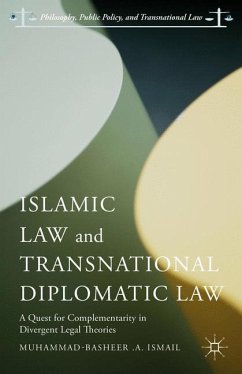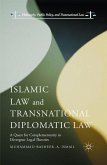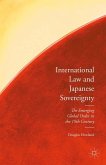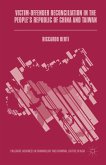This book, in its effort to formulate compatibility between Islamic law and the principles of international diplomatic law, argues that the need to harmonize the two legal systems and have a thorough cross-cultural understanding amongst nations generally with a view to enhancing unfettered diplomatic cooperation should be of paramount priority.
The book explores the compatibility of Islamic law and international diplomatic law, aiming to maximize diplomatic protection in Muslim states by invoking Islamic law in support of international diplomatic law at national level. The author investigates the concept of diplomatic immunities and privileges under Islamic law and modern international law in theory and practice. The core of the book engages theoretical analyses of the two legal systems with a view to ascertaining the presence of any compatibility or tension in their respective principles on diplomatic law and then, examines the practices of some Muslim states within the context of that theoretical analysis. Ismail proposes that two legal systems are compatible and can be harmonized to enhance the concept of diplomatic immunities and privileges in Muslim states. The book facilitates a better understanding of the relationship that exists between Islamic diplomatic law and international diplomatic law with the hope to ultimately maximize diplomatic protection by clarifying and developing Islamic diplomatic law, which may eventually complement international diplomatic law.
The book explores the compatibility of Islamic law and international diplomatic law, aiming to maximize diplomatic protection in Muslim states by invoking Islamic law in support of international diplomatic law at national level. The author investigates the concept of diplomatic immunities and privileges under Islamic law and modern international law in theory and practice. The core of the book engages theoretical analyses of the two legal systems with a view to ascertaining the presence of any compatibility or tension in their respective principles on diplomatic law and then, examines the practices of some Muslim states within the context of that theoretical analysis. Ismail proposes that two legal systems are compatible and can be harmonized to enhance the concept of diplomatic immunities and privileges in Muslim states. The book facilitates a better understanding of the relationship that exists between Islamic diplomatic law and international diplomatic law with the hope to ultimately maximize diplomatic protection by clarifying and developing Islamic diplomatic law, which may eventually complement international diplomatic law.
'Dr. Ismail shows how Islamic law and international diplomatic law are mutually reinforcing and largely complementary. Where there is divergence, there can be harmonization: the nature of his project is conversation, not conflict. Dr. Ismail has produced a rigorous work that blends theoretical inquiry and examples from Muslim State practice. This is an important contribution to the existing scholarship that, it is hoped, will enhance compliance in the area of diplomatic privileges and immunities.' - Robert P. Barnidge, Jr., Lecturer and Coordinator of International Relations, Department of History, Politics, and International Relations, Webster University, USA








